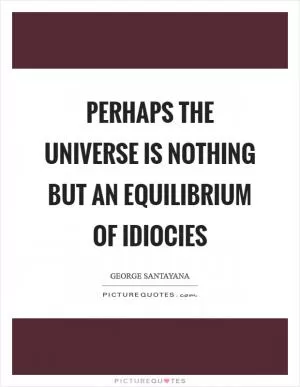Miracles are propitious accidents, the natural causes of which are too complicated to be readily understood

Miracles are propitious accidents, the natural causes of which are too complicated to be readily understood
George Santayana, a renowned philosopher and essayist, once stated that miracles are propitious accidents, the natural causes of which are too complicated to be readily understood. This statement encapsulates Santayana's belief in the mysterious and inexplicable nature of miracles, which he viewed as occurrences that defy rational explanation and transcend the limits of human understanding.Santayana's perspective on miracles can be seen as a reflection of his broader philosophical outlook, which emphasized the importance of embracing the unknown and acknowledging the limitations of human knowledge. In his work, Santayana often explored the complexities of human experience and the ways in which individuals grapple with the mysteries of existence. For Santayana, miracles represented a profound and enigmatic aspect of reality that challenged conventional modes of thinking and invited individuals to contemplate the possibility of the extraordinary.
By describing miracles as propitious accidents, Santayana suggested that these events are not simply random occurrences, but rather have a purpose or significance that is beyond human comprehension. In his view, miracles are not arbitrary or capricious, but rather serve as manifestations of a higher order or divine plan that is beyond the grasp of human intellect. By acknowledging the mysterious and inscrutable nature of miracles, Santayana encouraged individuals to approach these events with humility and awe, recognizing the limits of human understanding in the face of the miraculous.
Furthermore, Santayana's assertion that the natural causes of miracles are too complicated to be readily understood underscores his belief in the complexity and intricacy of the natural world. For Santayana, the universe is a vast and intricate web of interconnected phenomena, where even seemingly random or inexplicable events are governed by underlying laws and principles that are beyond human comprehension. By acknowledging the limitations of human knowledge and understanding, Santayana invited individuals to embrace the mystery and wonder of the world around them, recognizing that there are forces at work that are far beyond our control or understanding.












 Friendship Quotes
Friendship Quotes Love Quotes
Love Quotes Life Quotes
Life Quotes Funny Quotes
Funny Quotes Motivational Quotes
Motivational Quotes Inspirational Quotes
Inspirational Quotes